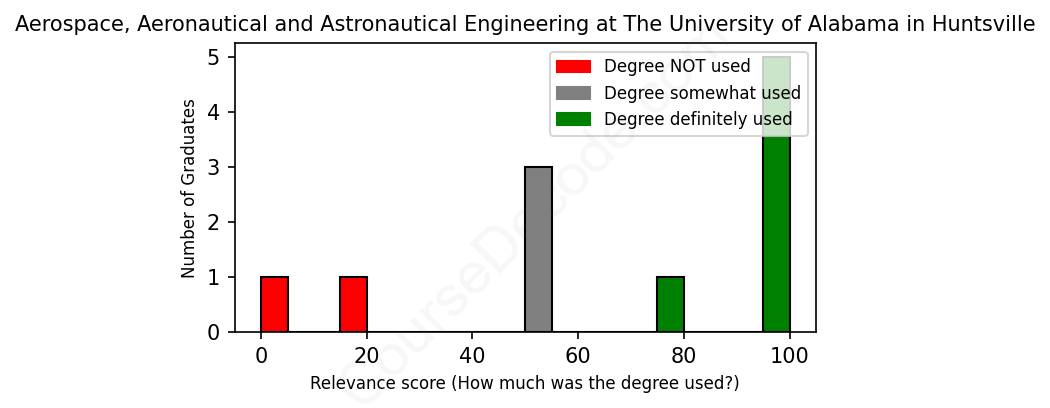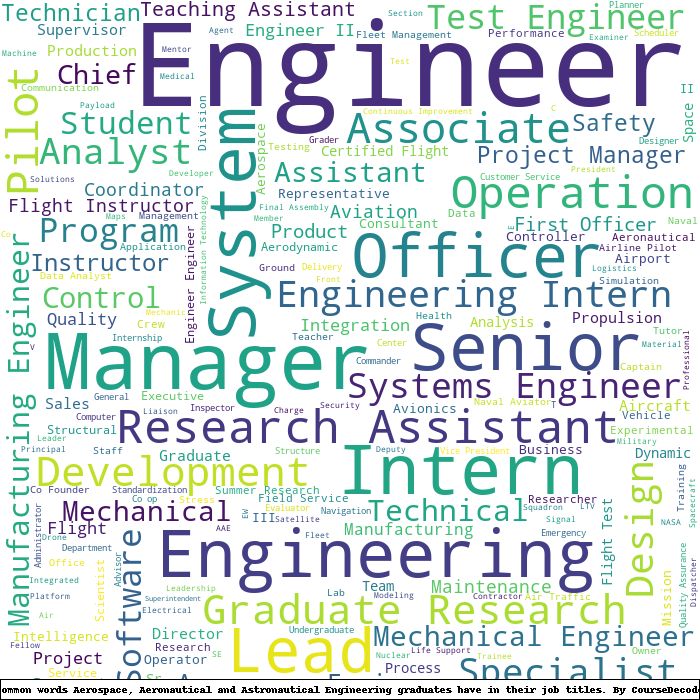
First, some facts. Of the Aerospace, Aeronautical and Astronautical Engineering graduates from The University of Alabama in Huntsville we've analyzed , here's how many have used (or NOT used) their degree in their career:

These are estimates based on AI analysis of 11 LinkedIn profiles (see below).
The verdict? On par with the average. Overall, with an average relevance score of 67%, Aerospace, Aeronautical and Astronautical Engineering graduates from The University of Alabama in Huntsville have about the same likelihood of finding work in this field as the average graduate across all fields:
And for comparison, here's the chart for all profiles we've looked at across all degrees.
Also, after graduating, only 18% of these graduates have pursued further education other than another Bachelor's degree (such as a Masters degree or other), compared to the average across all profiles of 35%. This suggests a Bachelors degree is enough for most Aerospace, Aeronautical and Astronautical Engineering graduates, and it's normal to look for work straight after graduation.
See the details:
|
Relevance score: 0% We think this person has NOT gone into a career related to their degree. We think this person has NOT gone into a career related to their degree.
DEGREE INFOGraduated in 2022 from The University of Alabama in Huntsville with a Bachelor's degree in Aerospace, Aeronautical and Astronautical Engineering. No other secondary education since. JOB HISTORY SINCE GRADUATIONDelivery Specialist The Home Depot Apr 2022 - Present ABOUTHello, my name is [NAME REMOVED] Beasley and I am a recent graduate from The University of Alabama in Huntsville with a Bachelors's in Aerospace Engineering. Being born and raised here in the rocket city, I discovered a passion for what lies beyond current scientific capabilities and discovering innovative solutions to complex scenarios. Overall, I am seeking an engineering/scientist position utilizing analytical problem-solving, testing, and management skills. |
The top 10 most common jobs done by the graduates we've analyzed (ranked most common to least) are:
Most of the jobs held by graduates of the Aerospace, Aeronautical, and Astronautical Engineering program at The University of Alabama in Huntsville tend to vary quite a bit in relevance to their degree. A significant number of graduates find positions as Aerospace Engineers, Systems Engineers, or in similar technical roles at companies like Northrop Grumman and Analytical Mechanics Associates. These jobs are definitely in the field; they utilize the advanced skills and knowledge that are central to their education, from system design to aerospace principles. It's pretty clear that these roles align well with what they studied, giving them a chance to apply their learning in real-world scenarios.
On the flip side, there's a noticeable number of graduates who took on roles that aren't closely related to aerospace engineering. For instance, jobs like Customer Service Supervisor, Delivery Specialist, and even Facilities Manager have little to do with their aerospace training. Some positions, like Software Engineer, might use general problem-solving skills but often drift away from the technical aspects of aerospace. It shows that while there's a solid representation of graduates working in relevant aerospace engineering positions, there’s also a chunk of them exploring various fields that don’t necessarily connect to their degree. So, it’s a mixed bag overall!
Here is a visual representation of the most common words in job titles for Aerospace, Aeronautical and Astronautical Engineering graduates (this is across all Aerospace, Aeronautical and Astronautical Engineering graduates we've analyzed, not just those who went to The University of Alabama in Huntsville):

Graduates from the University of Alabama in Huntsville with degrees in Aerospace, Aeronautical, and Astronautical Engineering have generally followed promising career trajectories that align closely with their field of study. For many, the first job after graduation tends to jumpstart their careers in aerospace or related sectors. For instance, people graduating in 2020 found positions like Aerospace Engineer, or related roles within notable companies such as Northrop Grumman and Analytical Mechanics Associates. Even those who started off in different roles, like customer service or leadership positions at space centers, often transitioned into more technical engineering jobs shortly after. This indicates a strong emphasis on leveraging their degree and skills in the aerospace sector right from the beginning.
Fast forward five to ten years, and it looks like a good portion of these graduates have continued to grow in their careers, often remaining within major aerospace firms or government roles, such as those at Edwards Air Force Base or within the systems engineering area at Northrop Grumman. Some graduates have even taken on specialized roles like Aerothermal Engineer, which reflects a trend toward focusing on specific areas of expertise. While there are a few who have ventured into unrelated fields, like construction support and facilities management, the overall data suggests that most graduates are indeed building successful careers relevant to their education. So, if you're considering a degree in aerospace engineering, the outlook appears quite favorable! Many seem to be making the most of their education and landing solid jobs in the industry.
Honestly, a Bachelor’s degree in Aerospace, Aeronautical, and Astronautical Engineering is no walk in the park; it's definitely on the challenging side. The coursework dives deep into advanced math, physics, and engineering principles, which can feel overwhelming at times. But don’t let that scare you off! If you’re really passionate about it and ready to put in the effort, you'll find it rewarding. Also, some people find it harder than other engineering programs because of the complexity of the topics involved, like fluid dynamics and propulsion systems. So, be prepared for some late nights and tough exams, but also know that it can be really fascinating and fulfilling if you’re into space and airplanes!
Most commonly, in the LinkedIn profiles we've looked at, it takes people 4 years to finish a Bachelor degree in Aerospace, Aeronautical and Astronautical Engineering.
So, looking at these recent Aerospace, Aeronautical, and Astronautical Engineering grads from The University of Alabama in Huntsville, it seems like they're generally doing pretty well money-wise. The ones who landed positions as engineers, especially at big companies like Northrop Grumman and General Dynamics, are likely raking in decent salaries, probably somewhere in the range of $70,000 to $100,000 a year, given the industry standards. Even those who are in roles like Operations or Customer Service at airlines have decent starting salaries, but they might not be as high as their engineering peers. Overall, it looks like a promising start for most, with good potential for growth!
Here is a visual representation of the most common words seen in the "about" section of LinkedIn profiles who have a Bachelor degree in Aerospace, Aeronautical and Astronautical Engineering (this is across all Aerospace, Aeronautical and Astronautical Engineering graduates we've analyzed, not just those who went to The University of Alabama in Huntsville). This may or may not be useful:

Here are all colleges offering a Bachelor degree in Aerospace, Aeronautical and Astronautical Engineering (ordered by the average relevance score of their Aerospace, Aeronautical and Astronautical Engineering graduates, best to worst) where we have analyzed at least 10 of their graduates:
| College | Score | Count |
|---|---|---|
 Texas A&M University Texas A&M University
|
87 | 22 |
 California Polytechnic State University-San Luis Obispo California Polytechnic State University-San Luis Obispo
|
86 | 12 |
 University of Cincinnati University of Cincinnati
|
86 | 10 |
 Purdue University Purdue University
|
85 | 40 |
 Rensselaer Polytechnic Institute Rensselaer Polytechnic Institute
|
85 | 17 |
 Georgia Institute of Technology Georgia Institute of Technology
|
84 | 23 |
 Liberty University Liberty University
|
81 | 21 |
 Iowa State University Iowa State University
|
80 | 16 |
 University of Colorado Boulder University of Colorado Boulder
|
80 | 13 |
 California State Polytechnic University-Pomona California State Polytechnic University-Pomona
|
79 | 13 |
 United States Naval Academy United States Naval Academy
|
77 | 12 |
 The Ohio State University The Ohio State University
|
76 | 20 |
 University of Central Florida University of Central Florida
|
75 | 25 |
 Arizona State University Arizona State University
|
74 | 12 |
 University of Michigan University of Michigan
|
74 | 10 |
 Embry-Riddle Aeronautical University Embry-Riddle Aeronautical University
|
71 | 163 |
 Penn State University Penn State University
|
68 | 12 |
 Florida Institute of Technology Florida Institute of Technology
|
67 | 20 |
 The University of Alabama in Huntsville The University of Alabama in Huntsville
|
67 | 11 |
 Embry Riddle Aeronautical University-Worldwide Embry Riddle Aeronautical University-Worldwide
|
66 | 10 |
 University of Illinois at Urbana-Champaign University of Illinois at Urbana-Champaign
|
48 | 10 |